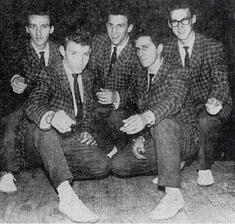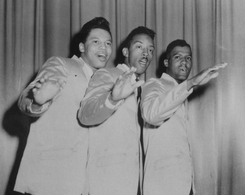-
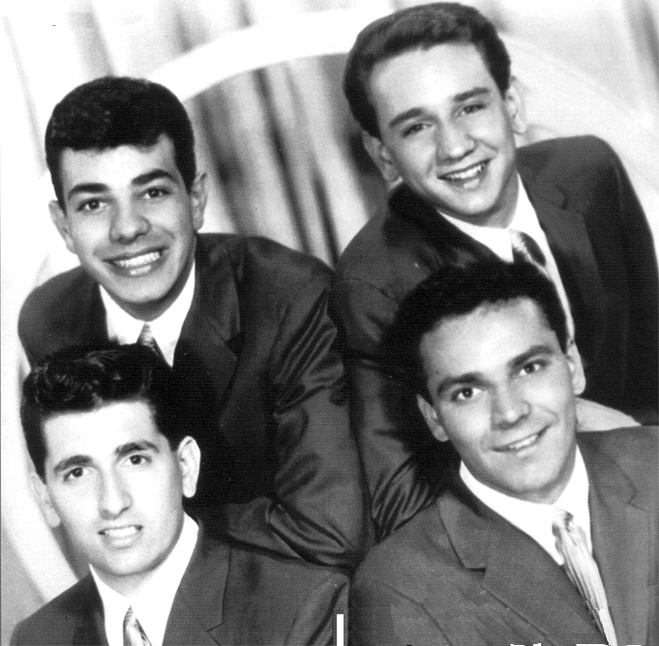
The Classics (3) (Brooklyn, New York)
Personnel :Emil Stucchio (Lead)
Tony Victor (First Tenor)
John Gambale (Second Tenor)
Jamie Troy (Bass)
Discography :The Classics (3)
Singles :
1960 - Cinderella / So In Love (Dart 1015)
1961 - Life's But A Dream, Sweetheart / That's The Way (Dart 1024 / Mercury 71829)
1963 - Till Then / Enie Minie Mo (Musicnote 1116)
1963 - P.S. I Love You / Wrap Your Troubles In Dreams (Musicnote 118)
1964 - Life's But A Dream / Nuttun In The Noggun (The Classics And Mr. Raccoon) (Streamline 1028)
1964 - Too Young / Who's Laughing, Who's Crying (Musictone 6131)
1964 - You'll Never Know / Dancing With You (Stork 2)
1965 - I Apologize / Love For Today (Piccolo 500)
1965 - Over The Weekend / Dancing With You (Josie 939)
1972 - The Way You Look Tonight / Again (Bed-Stuy 222)Unreleased :
196? - Portrait Of A Fool
196? - Sincerely
196? - DeserieHerb Lance & The Classics (3)
1961 - Blue Moon / Little Boy Lost (Herb Lance) (Promo 1010)
Biography :
Lead singer of the group formed in 1958 as the “Perennials” was Emil Stucchio. The others were first tenor Tony Victor, second tenor John Gambale and bass Jamie Troy. All were between 14 and 16 years of age. While performing at the Club Illusion on New Utrecht Avenue, the show’s host, comedian Sam Sardi, tried in vain to introduce the group but couldn’t pronounce “Perennials.” He called the group onstage and asked whether they could come up with a simpler moniker. When they couldn’t, he introduced them as “The Classics,” a name which stuck. The group played teen hops, developing a style of white doo-wop similar to a group they would later hear of from Jersey City — The Duprees.
Baritone Louis Rotundo of The Passions group (neighborhood friends of the Classics) recommended the group see their manager Jim Gribble. Unbeknownst to The Passions, they were only five months away from “Just To Be With You,” their only national chart record. The Classics took Louis’s advice and went to Gribble’s office with several other groups to audition. They didn’t realize at the time that Roger Sherman, owner of Dart Records in Manhattan, was sponsoring the audition in search of a new act. They were immediately signed and went about writing a song in a novelty vein under Sherman’s direction.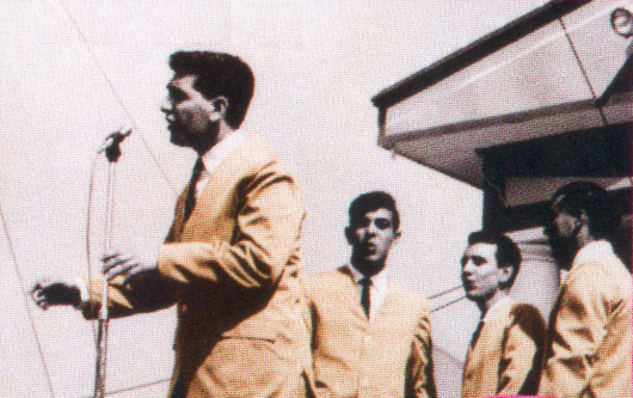
The group came up with an idea from the movie classic “Cinderella” that they interpreted in teenage street corner terms. The song climaxed a fun-filled rock doo-wopper in a style reminiscent of groups of the late 1950s and early 1960s. The Classics’ “Cinderella” was recorded in late summer of 1959 at Bell Sound Studios in Manhattan. The band backing the boys on the number was reportedly the Virtues of “Guitar Boogie Shuffle” fame (May 1959). The record started out strong but never made the charts nationally. Some sources claim it sold over 50,000 copies in the tri-state area as well as in Philadelphia.
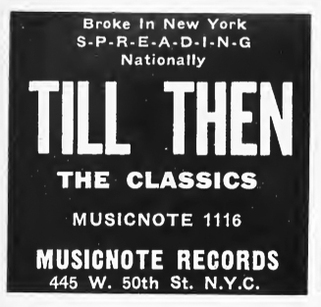

Late in 1959 the group cut two more sides for Dart Records: “Angel Angela,” a badly mixed, less-than-competitive ballad, and a B side that droned along under the title “Eeenie, Meenie, Meinie and Mo.” It was not released until a year later, just before Dart went out of business. The Classics’ third Dart session was “Life Is But a Dream” backed with “That’s the Way It Goes” — both having been done previously by the Harptones. Soon after these sides were issued on Dart in 1961, the masters were sold to Mercury Records, then somehow the “Life” side also wound up on the Streamline label. This gave The Classics the same recording released on three different labels in the same year. Although it was a good up-tempo record, the Earls’ version on the small independent Rome Records blew it away on the East Coast.
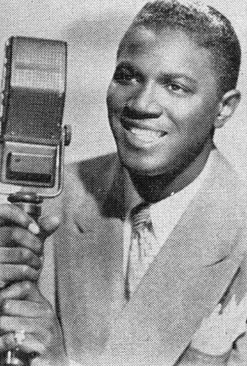

Herb LanceMercury then “lent” The Classics to its affiliate, Promo Records, to back up rhythm and blues vocalist Herb Lance for a similarly styled rendition of “Blue Moon.” Over a year passed before The Classics got another opportunity with a label. Andy Leonetti set up the Musicnote label and asked The Classics to record for him. Larry Lucie, an arranger with heavy R&B tendencies, was directed to give a pop rhythm and blues treatment to the old standard “Till Then” for the group. This transformed them from a ‘60s doo wop act into a ‘50s-styled quartet of crooners.

The song was recorded on Jan. 25, 1963. On June 22nd the record, replete with walking vocal bass and Emil’s best-ever lead, hit the charts 19 years after the Mills Brothers version had reached number eight. The Classics’ recording went to number 20. Their next single, in late 1963, was the standard “P.S. I Love You.” Lacking the same magic and radio support, it failed to click nationally.Several more releases for Stork, Josie, and Piccollo between 1965 and 1967 had the same results and the group drifted apart. In 1971, Emil, Jamie, baritone Lon Rotundo and tenor Steve Misciagno formed a new Classics renamed the Profits, recording a mid-tempo version of “The Wind” for Sire Records. By the summer of 1972 the group was down to a trio of Emil, Lou and Kenny Gill but was again called The Classics.
The Classics last recording came from the miniscule Bed-Stuy label in 1972 when they did two standards : “The Way You Look Tonight“ and “Again“. A decade later the trio was still doing occasional shows with Albie Galione taking Kenny Gill’s place.Later Tony Victor took a seat on the New York Stock Exchange, Jamie Troy went into the scrap iron business, John Gambale became a commercial artist and Emil Stuccio became a policeman for the NYC Transit Authority. The Classics’ up sides were early examples of white novelty rock while their ballad style served as a bridge between acts like the Four Aces of the ‘50s and the Duprees of the ’60s.
 your comment
your comment
-

The Spartans (1) (Cleveland, OH.)
Personnel :
Richard Howard (Lead)
Curtis Hafley (First Tenor)
Ronald Howard (Second Tenor)
Paul Mahaly (Baritone/Bass)
Herb Hinton (Bass)
Discography :
1954 - Faith, Hope And Charity / Lost (Capri 7201)
Biography :Cleveland doo wop group the Spartans formed in 1950. According to Marv Goldberg's profile in the March 1999 issue of Discoveries, lead Richard Howard, his tenor brother Ronald, first tenor Curtis Hafley, baritone Paul Mahaly, and bass Herb Hinton were childhood friends who began harmonizing on the grounds of the Carver Park Projects their respective families all called home. Originally dubbed the Mellow-Larks, the quintet often played local clubs, churches, and benefits in the company of pianist/arranger Lamar Gaines. In due time, they captured the attention of manager Al Rosen, who instituted the name change on grounds that the Mellow-Larks moniker was too similar to other, better-known acts.


Soon after, Hinton left the Spartans lineup to join the Renaults, prompting Mahaly to move to bass. Hinton nevertheless returned long enough to cut the group's debut single, "Lost," essentially a poem written by Rosen's business partner, Perry Stevens, set to music. Issued in the spring of 1954 on the tiny New York City label Capri, "Lost" emerged as a pet favorite of the influential Cleveland DJ Alan Freed, but despite success in other regional pockets including parts of Pennsylvania and Texas, the record's momentum failed to translate nationally. Its commercial failure, combined with the difficulty of finding a long-term replacement for Hinton, ultimately spelled the Spartans' demise. In the fall of 1955, Ronald Howard and Curtis Hafley both enlisted with the U.S. Air Force, although the group briefly reunited when they exited the military four years later.Jason Ankeny, All Music Guide.
http://www.uncamarvy.com/Spartans/spartans.html
Song :
Lost Faith, Hope And Charity...
 your comment
your comment
-
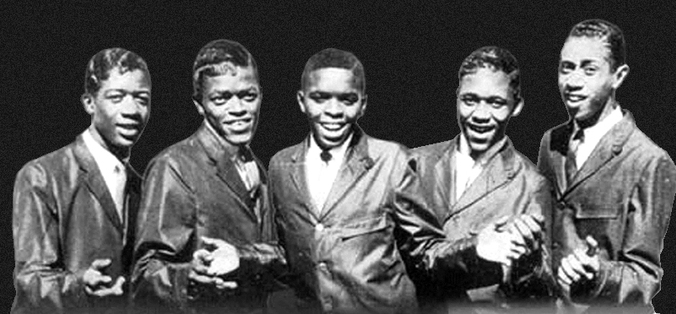
The Unique Teens (Bronx, New York)
Personnel :
Carl Petress (Lead)
Oscar Smith
Discography :
1957 - Watcha know New? / Run Fast (Dynamic 110/Relic518)
1958 - Jeannie / At The Ball (Ivy 112/Hanover 4510)Biography :
Carl Petress and the Unique Teens had a great two sided record in 1958. "Jeannie" got most of the play. WMGM 1050 in New York showed it on their last quarter of 1958 charts for a total of nine weeks. Other east coast stations also ran it up and down their surveys too. Ivy was the first issue, and the label was based in New York.
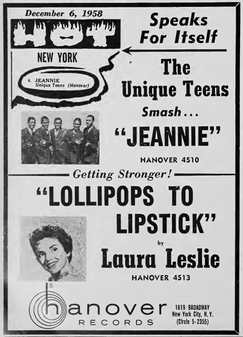

It really had just a few records before folding up. Hanover, also based in New York, on the other hand, must have purchased this one from Ivy and issued it themselves. None of the other Ivy discs show up in the Hanover catalog. Hanover produced a sizable amount of records, and I always felt they produced "Fun" records that were enjoyable and covered many different styles. The Unique Teens' 'Jeannie' in New York where it went R&B Top Five, December 1958.. The Bronx quintet made one other record, on another New York label, Dynamic.
Songs :
Jeannie At The Ball
Watcha know New? Run Fast....
 your comment
your comment
-

The Daytones (Utica, New York)
Personnel :
Ben DeIorio
John DeIorio
Don Danials
Nick Colaciccio
Joe Albanese
Discography :
1963 - Bless My Love / Krambuli (Jubilee 5452)
Biography :
The Daytones began singing together in 1956 when they appeared at the Block P minstrel show. Since then they've been heard widely in Utica, at Utica College, organization banquets and benefits.. They specialize in harmonic ballads with occasional jazz numbers

The combo features ballads like "Laura." "I Apologize," "Speak Low," and "A Lovely Way to Spend an Evening." Though steering clear of rock 'n' roll, the group occasionally tries rhythm numbers with a decided beat, "Charlie's Chant." a number they feel will soon be a hit, is their favorite jazz number. DeIorio said the next step after tonight's appearance will be to cut a new record which they will distribute widely to record companies. They also are scheduled to take part in a regiment amateur contest that could result in a contract with a large company as well as appearances in large cities. Jubilee Records released nationally a recording by Utica's singing quartet, The Daytones.


The recording includes two songs, "Bless MY Love" and "Krambuli," both arranged and conducted by another Utican, Torrie Zito.Zito conducted a full orchestra for the arrangements designed especially for the group. "Bless My Love" is a romantic ballad interpreted by the Daytones through climatic chord changes. "Krambuli" is a jazz number written by Ben DeIorio and Colacicco. The Daytones are scheduled for promotional radio and television programs and personal appearance tours in New York City and throughout the country. Jubilee Records mailed more than 8,000 copies of the record to disc jockeys, in addition to obtaining national publicity for the quartet.
Songs :
Bless My Love Krambuli your comment
your comment
-

The Rivileers (Queens, New-York)
Personnel :Gene Pearson (Tenor Lead)
Herb Crosby (First Tenor)
Errol Lennard (Second Tenor)
Alfonso Delaney (Baritone)
Milton Edwards (Bass)
Discography :
The Rivileers
Singles :
1954 - Darling Farewell / Forever (Baton 201)
1954 - Eternal Love / Carolyn (Baton 205)
1954 - For Sentimental Reasons / I Want To See My Baby (Baton 207)
1955 - Don't Ever Leave Me / Little Girl (Baton 209)
Unreleased :
1954 - I (Baton)
1954 - Sing Little Bird (Baton)
1954 - How Am I To Know (Baton)
1954 - Deep Down Inside (Baton)Gene Pearson & The Rivileers
1953 - A Thousand Stars / Hey Chiquita (Baton 200)
1957 - A Thousand Stars / Who Is The Girl (Baton 241)Biography :
The Rivileers enjoyed a short (less than two years) recording career from 1954 to 1955. They formed in Jamaica Queens, NY, and at one time included actor Lou Gossett who claims he sung with them on "A Thousand Eyes." Led by Eugene Pearson, the Rivileers most stable lineup consisted of neighborhood and high school buds: Pearson, Milton Edwards, Earl Lennard, Herb Crosby, and Alphonso Delaney. They cut a demo and left it as a resume in a record shop. Sol Rabinowitz (a salesman for a record distributor) heard the multi-song demo and decided to venture into the recording business. Pearson had previously sung with the Embers and co-wrote "Paradise Hill" for them in 1953, a year before the Rivileers first single hit the streets.
 Rabinowitz redid the songs with jazz musicians giving the tracks an upscale sound, but after futile attempts at leasing the masters (he cut four), Rabinowitz decided to go it on his own and formed Baton Records. The label's first single (1954) "A Thousand Stars" (written by Pearson) backed by "Hey Chiquita" was credited as Gene Pearson & the Rivileers. Despite limited distribution the record was Top Ten in many cities. Baton followed it up with "Forever" b/w "Darling, Farewell," a hit as well, but not as big. The first two singles bore the catalog numbers Baton 200 and 201, the Rivileers third single "Eternal Love" b/w "Carolyn" catalog number was 205, indicating Rabinowitz had issued three non-Rivileers recordings in the interim. (Buddy Tate and his Band cut Baton single #202.) Unlike their first two singles the Rivileers' third effort flopped, but Baton scored with the Buddy Tate record.
Rabinowitz redid the songs with jazz musicians giving the tracks an upscale sound, but after futile attempts at leasing the masters (he cut four), Rabinowitz decided to go it on his own and formed Baton Records. The label's first single (1954) "A Thousand Stars" (written by Pearson) backed by "Hey Chiquita" was credited as Gene Pearson & the Rivileers. Despite limited distribution the record was Top Ten in many cities. Baton followed it up with "Forever" b/w "Darling, Farewell," a hit as well, but not as big. The first two singles bore the catalog numbers Baton 200 and 201, the Rivileers third single "Eternal Love" b/w "Carolyn" catalog number was 205, indicating Rabinowitz had issued three non-Rivileers recordings in the interim. (Buddy Tate and his Band cut Baton single #202.) Unlike their first two singles the Rivileers' third effort flopped, but Baton scored with the Buddy Tate record.

The following year (1955) saw the release of "For Sentimental Reasons" b/w "I Want to See My Baby," which chocked up some sales, trailed by "Don't Ever Leave Me" b/w "Little Girl" the same year but no more records followed and the group disbanded. Baton reissued "A Thousand Stars" in 1957 with a new flip, "Who Is That Girl," but that was the final shot for the Jamaica Queens hopefuls. Every single after the first was credited as simply the Rivileers. Some unreleased Rivileers' recordings have surfaced, including "Deep Down Inside," a yearning ballad.

Kathy Young & the Innocents had an even bigger hit with "A Thousand Stars" in 1960; Young was only 15 when she redid it, the Los Angeles native was quite familiar with the song cause the Rivileers' original was number one in L.A. in 1954. The song, which also was redone by Britain's Billy Fury (1961), has amassed more than a million performances with B.M.I. Pearson also wrote "Eternal Love" and "Don't Ever Leave Me" for the Rivileers and later sang with the Cleftones (co-writing a few of their songs including "Time Is Running out on Love"); he then replaced Dock Green in the Drifters and sang second tenor on many of their hits from 1962 to 1966.



He sandwiched a two-year stint with the military between the Cleftones and Drifters stints and retired as a New York Transit Police Officer in 1987. Delaney is a Reverend but the career paths of the others are unknown. Baton had a couple more hits with the Hearts before Zell Sanders got them, but faded from the scene before the '60s rolled in. The Rivileers regrouped June 6, 1999 for the A Great Day In Harlem event and talked about old times. Eugene Pearson passed April 6, 2000 in Silver Springs, MD, where he relocated after retiring from the New York Transit Authority.
http://www.uncamarvy.com/Rivileers/rivileers.html
...
 your comment
your comment
Doo Wop - Rhythm & Blues - Mail : jcpiazza26@gmail.com


